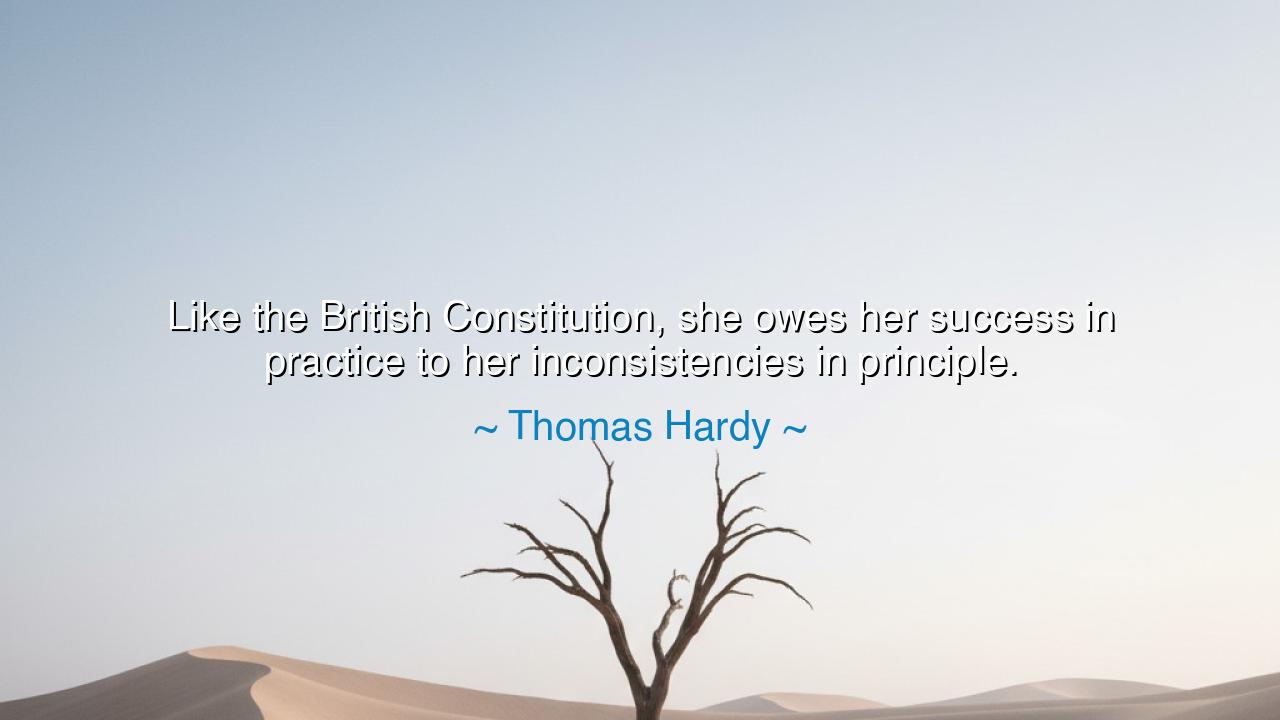
Like the British Constitution, she owes her success in practice
Like the British Constitution, she owes her success in practice to her inconsistencies in principle.






Hear the keen words of Thomas Hardy, who declared: “Like the British Constitution, she owes her success in practice to her inconsistencies in principle.” This saying, though crafted in the observation of law and society, reaches far beyond the politics of Britain, and touches upon the paradox of human greatness: that perfection in principle is often too rigid to endure, while adaptability, even clothed in contradiction, may carry the seed of endurance.
The British Constitution, unlike the fixed charters of many nations, was never written in a single stroke. It grew instead through centuries—through custom, statute, compromise, and the balancing of powers between crown, parliament, and people. To the logical mind, this seems inconsistent, even chaotic. Yet, as Hardy noted, it is precisely this flexibility—this willingness to bend, shift, and contradict itself—that has allowed it to survive storms that shattered other nations. Here lies the paradox: inconsistency in theory, but resilience in life.
History abounds with such examples. Consider Rome, which in its early days was a republic of laws and citizen assemblies. In principle, it despised kingship, for it had expelled its monarchs. Yet in times of crisis, it appointed dictators with absolute power for a limited season. Was this not inconsistent with its principles? Yes. But in practice, this adaptation saved the Republic again and again. Its willingness to stray from rigid principle was the very thing that preserved its strength.
So too in the story of Abraham Lincoln. He revered liberty and union, yet in the furnace of civil war he suspended habeas corpus, a principle sacred to democracy. Critics accused him of inconsistency. Yet, through this pragmatic choice, he preserved the Union itself, without which liberty might have perished altogether. Here again, success in practice was born not of unbending principle, but of wise and timely departure from it.
Thus Hardy’s insight reveals the eternal struggle between principle and practice. To cling too tightly to ideals without compromise is to risk shattering under the weight of reality. To abandon principle entirely is to lose direction. But to walk the middle path—to hold ideals in the heart while bending them with wisdom to meet the storms of life—this is the way of endurance, whether for a constitution, a nation, or an individual soul.
The lesson, O seekers, is not to despise principle, but to understand its purpose. Principles are stars by which we steer, but they are not the waves beneath our boat. When the seas grow violent, one must adjust the sails, even if it means seeming inconsistent. The wise are not those who boast of never changing, but those who know when to bend, and in bending, preserve the essence of their truth.
Practically, let each of you embrace this balance. Hold to your guiding values, but do not chain yourself so tightly to them that you cannot adapt when life demands it. If justice is your principle, know that mercy may sometimes temper it. If freedom is your ideal, know that order may sometimes sustain it. If truth is your goal, know that kindness may sometimes soften its edge. In this way, like the British Constitution, you will find resilience not in rigid purity, but in living harmony with life’s contradictions.
Thus, Thomas Hardy’s words echo across the ages: “She owes her success in practice to her inconsistencies in principle.” Remember this paradox, O children of tomorrow. For it teaches that the soul, like the state, must not strive for impossible perfection, but for enduring balance. And in that balance lies true strength, the kind that bends but does not break, adapts but does not betray, and through its inconsistencies, achieves the highest form of success.






AAdministratorAdministrator
Welcome, honored guests. Please leave a comment, we will respond soon